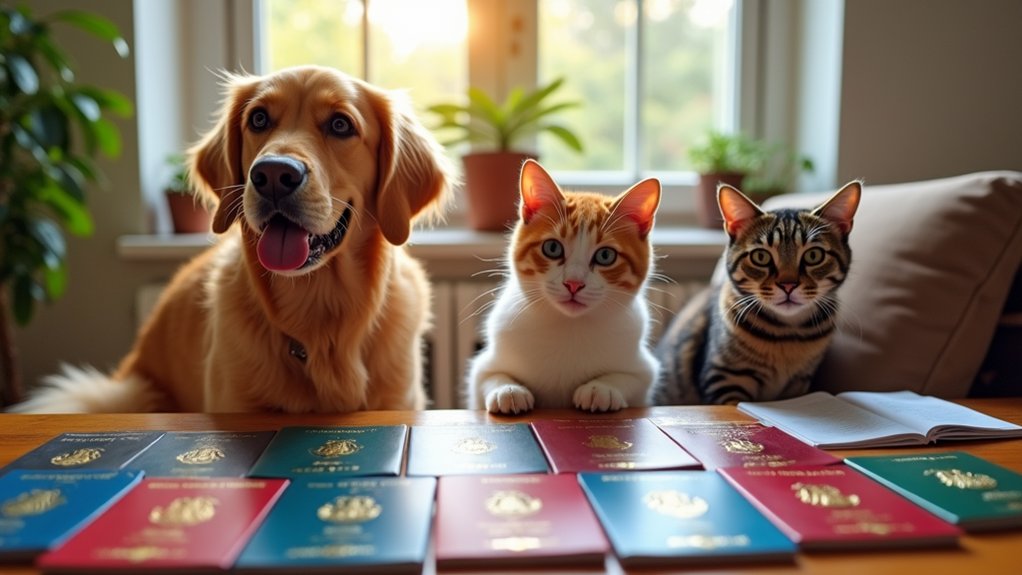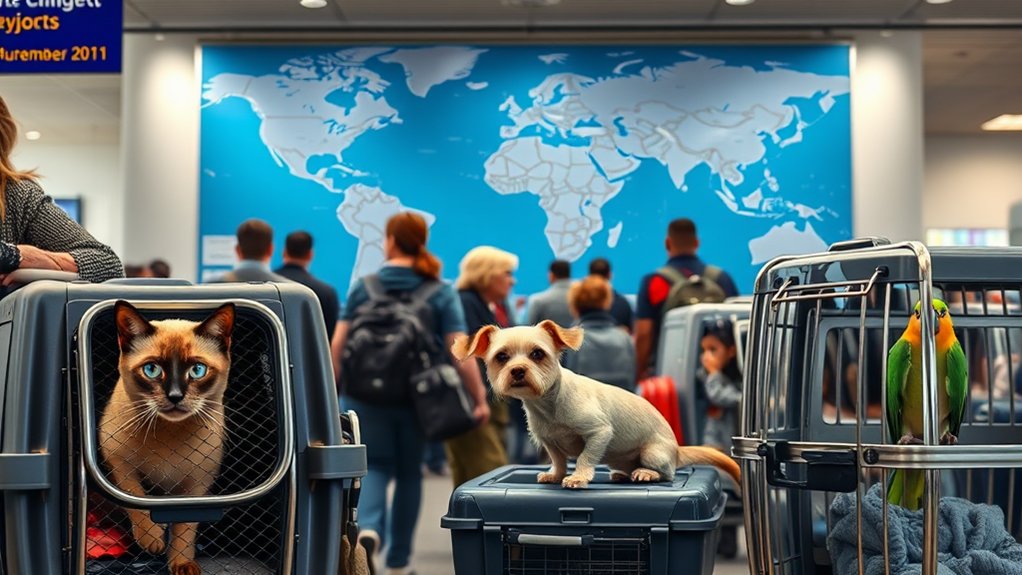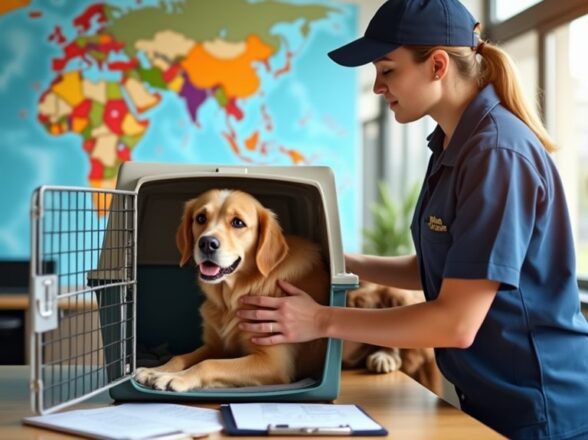What Are the Legal Requirements for Moving Pets Internationally? A Country-by-Country Guide

When moving pets internationally, you must follow specific legal requirements that vary by country. Generally, you'll need a health certificate from a licensed veterinarian, issued within 7 to 30 days of travel. Your pet should have a rabies vaccination at least 30 days prior. Many countries require microchips for identification. Import permits may also be necessary. It's important to check breed-specific restrictions in your destination. To guarantee compliance, prepare all necessary documents ahead of time. Understanding these details is vital for a smooth journey. There's more to explore about specific country regulations and preparation tips.
Overview of International Pet Travel

When planning to take your pet abroad, understanding the landscape of international pet travel is essential. Each country has its own regulations that can greatly impact your trip. Most places require an international health certificate issued by a licensed veterinarian. Additionally, many countries mandate a rabies vaccination at least 30 days before travel. For example, regions like Australia and Japan have strict quarantine laws, which may mean your pet has to stay isolated upon arrival. In the European Union, you'll need an EU Pet Passport that includes microchip identification and vaccination records. Countries like the UAE often require import permits, so make certain you have the correct documentation ready to guarantee a smooth entry for your pet.
Preparing Pets for Travel
When preparing your pet for international travel, it's essential to research your destination country's specific regulations. You'll need to schedule a veterinary visit to obtain necessary health certificates and guarantee vaccinations are current. Additionally, microchipping your pet is often required for identification, so be sure to include that in your preparations.
Research Destination Regulations
Before you commence your international journey with your pet, it is essential to thoroughly research the specific regulations of your destination country. Understanding these travel regulations helps guarantee a smooth experience during customs clearance.
- Check for breed restrictions that may apply.
- Confirm vaccination requirements, especially for rabies.
- Determine if an import permit is needed and how to obtain it.
- Look into additional health documentation from a licensed veterinarian.
Each country has unique pet travel requirements. Some may require microchipping, while others mandate health certificates issued shortly before travel. To stay updated, consult online resources like Pets Abroad UK. This preparation can save you time and stress during your journey.
Health Certificates and Vaccinations
Preparing your pet for international travel involves obtaining essential health certificates and guaranteeing vaccinations are up to date. Health certificates are mandatory for pets traveling abroad. These documents must be issued by a licensed veterinarian within a specific timeframe, typically 7 to 30 days before travel. You'll also need to guarantee your pet is vaccinated against rabies at least 21 days prior to departure, as this is a universal requirement. Some countries might ask for additional vaccinations like leptospirosis or distemper, so check your destination's specific requirements. Keep in mind that you'll need to provide your pet's microchip number, as having an ISO-compliant microchip is often necessary for identification and traceability.
Microchipping and Identification Requirements
Microchipping your pet is essential for safeguarding their safe travel and identification abroad. Many countries mandate microchipping for pet identification, helping lost pets find their way home. Here are some key points to contemplate:
- Use ISO 11784/11785 compliant microchips for international recognition.
- Microchip your pet before their rabies vaccination, as required by some countries.
- Confirm pets are at least eight weeks old before microchipping.
- Include microchip details in the pet passport and travel paperwork.
Having a microchip increases your pet's chances of returning if they get lost. Documentation should include the microchip number and veterinarian information to guarantee smooth entry into your destination country. Proper microchipping simplifies the moving process for you and your pet.
Country-Specific Regulations

When moving pets internationally, you need to understand the specific regulations of your destination country. This includes obtaining the necessary import permits, securing health certificates, and being aware of any breed-specific restrictions. Familiarizing yourself with these requirements can help guarantee a smoother shift for you and your pet.
Import Permit Requirements
Many countries have specific import permit requirements for bringing pets across their borders, which can vary considerably. Here are some key points to keep in mind:
- The U.S. usually doesn't require an import permit, unless from high-risk rabies areas.
- Australia mandates an import permit, requiring health checks and documentation well before pets travel.
- The UAE allows only two pets per import permit, with more needing separate permits.
- Most EU countries accept a valid EU Pet Passport instead of an import permit, but vaccination and health certificate compliance is still essential.
Understanding these import permit requirements is vital for a smooth changeover when traveling with your pets. Always check the specific regulations for your destination well in advance.
Health Certificate Necessities
Obtaining a health certificate is essential for ensuring your pet meets the specific health requirements of the country you're traveling to. Most countries require this certificate from a licensed veterinarian to confirm your pet's health status and vaccination records. Typically, the health certificate needs to be completed within a timeframe of 7 to 30 days before your departure. For example, Australia requires pets to be vaccinated against rabies and undergo specific health examinations. In the European Union, a health certificate is crucial for international travel, often paired with an EU Pet Passport. Additionally, some countries may ask for extra documentation, like parasite treatment records, which should also be included in the health certificate. Pet owners must stay informed about these regulations.
Breed-Specific Restrictions
Understanding health certificate requirements is just one part of the puzzle when moving your pet internationally. You'll also need to take into account breed-specific restrictions that many countries impose. These restrictions can impact your plans if you have certain dogs and cats.
- Some breeds may be banned outright.
- Others may require special permits.
- Documentation is often needed for compliance.
- Non-compliance can lead to serious penalties.
For example, the UK prohibits breeds like the Pit Bull Terrier, while Australia bans the American Pit Bull Terrier. In New Zealand, ownership laws can be strict for certain breeds. Always check the specific breed laws before traveling internationally to avoid unexpected complications.
Health and Vaccination Requirements
When traveling internationally with your pet, it's vital to be aware of the health and vaccination requirements that vary by country. Most countries require a health certificate issued by a licensed veterinarian. This document confirms your pet's health and compliance with vaccination requirements. The rabies vaccination is universally mandatory and should be administered at least 30 days before travel and within 12 months of arrival. Some destinations may also have additional vaccination requirements, such as leptospirosis or distemper. It's important to check these specifics based on your destination. Be sure to comply with local agriculture standards regarding vaccinations and health documentation to avoid quarantine or denial of entry upon arrival.
Documentation Essentials

What documents do you need to travel internationally with your pet? When you're preparing to move your pet, it's crucial to gather the necessary paperwork. Here are some key items to take into account:
- A health certificate issued by a licensed veterinarian
- Proof of rabies vaccination administered at least 21 days before travel
- Import permits or pet passports required by your destination country
- Microchipping documentation, if required
Different countries have varying documentation requirements. The health certificate should confirm your pet's health status and vaccination history. Make sure you obtain it within the specified timeframe, usually 7 to 30 days before your trip. Always check the specific regulations for your destination to avoid any issues during travel.
Transportation Options and Policies
Choosing the right transportation option for your pet can greatly impact their travel experience. Airlines have different policies regarding pet travel, so check specific regulations before booking. Ground transportation is ideal for shorter distances, and pet relocation services can provide door-to-door assistance. Remember, travel crates must meet International Air Transport Association (IATA) standards to guarantee safety. Direct flights are best to reduce stress, while many airlines allow small pets in the cabin under certain conditions. Here's a quick comparison of transportation options:
| Option | Pros | Cons |
|---|---|---|
| Airlines | Specialized services | Varying policies |
| Ground Transport | Door-to-door availability | Limited to short distances |
| Pet Relocation Service | Extensive care | Potentially costly |
Costs Involved in Pet Relocation

Understanding the costs involved in pet relocation is essential, as they can quickly add up and impact your budget. Here are some key expenses to take into account:
- Initial veterinary examinations and health certificates (£150 – £300)
- Vaccinations and required documentation (several hundred pounds)
- Professional pet relocation services (£1,000 – £5,000)
- Quarantine fees if import regulations aren't met
The average cost for international pet transport ranges from £200 to £2,000, influenced by distance and service provider. Be sure to factor in these costs as you create your travel plans. Knowing the various costs associated with relocating your pet can help you prepare for a smooth change and avoid unexpected expenses during the process.
Airline-Specific Pet Guidelines
After budgeting for the costs of relocating your pet, it's important to familiarize yourself with airline-specific guidelines for pet travel. Each airline has its own rules regarding health certificates, vaccination records, and travel crates that meet International Air Transport Association (IATA) standards. Some airlines, like Emirates, require pets to travel in cargo, while others allow small dogs and cats in the cabin based on size and weight. Be sure to check each airline's policy on pet age and size, as most require pets to be at least eight weeks old and fully weaned. Finally, remember to make pre-travel arrangements. Airlines might require advance booking and specific documentation to avoid delays during check-in and boarding.
Additional Resources and Support

As you prepare to move your pet internationally, leveraging additional resources can simplify the process and secure compliance with legal requirements. Here are some helpful options:
- Pet relocation services for expert guidance and support
- Online resources like PetTravel.com for country-specific regulations
- Local veterinarians to assist with health certificates and vaccinations
- Community forums where you can connect with other pet owners
Using these resources can help you navigate the complexities of moving your pet. Pet relocation services can confirm all necessary documentation is in order. Additionally, community forums can provide valuable insights from those who've traveled similar paths. Staying informed and seeking support will make your pet's move smoother and more manageable.
Frequently Asked Questions
Can You Move Internationally With a Pet?
Yes, you can move internationally with a pet, but you'll need to navigate complex pet travel logistics. Familiarize yourself with international pet regulations, and consider using pet relocation services for a smoother experience.
How Do I Transfer My Animals From One Country to Another?
To transfer your animals internationally, you'll need to follow pet transport regulations, obtain animal health certificates, and use approved international pet carriers. Make certain you have all necessary documentation ready for a smooth changeover.
How Can I Export My Pet From UAE?
Did you know that nearly 40% of pets face travel complications? To export your pet from the UAE, follow export regulations, secure an export permit, and meet specific UAE requirements, including vaccination and microchipping for safe travel.
What Do You Need for an International Pet?
To guarantee smooth international pet travel, you'll need to follow pet travel regulations, secure health certificates, and be aware of quarantine requirements. Research specific guidelines for your destination country to avoid issues during your journey.
Conclusion
In conclusion, moving your pet internationally can feel like a complex puzzle. You'll need to navigate health regulations, documentation, and country-specific rules. Ironically, while you might think pets just pack their bags and go, it actually demands careful planning. Make certain you understand the requirements well before traveling. By doing your research and preparing thoroughly, you can make the process smoother for both you and your furry friend. Remember, a little upfront effort saves a lot of hassle later.
Related posts
Recent posts
Post Categories
Tags
Subscribe












